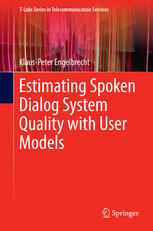

Most ebook files are in PDF format, so you can easily read them using various software such as Foxit Reader or directly on the Google Chrome browser.
Some ebook files are released by publishers in other formats such as .awz, .mobi, .epub, .fb2, etc. You may need to install specific software to read these formats on mobile/PC, such as Calibre.
Please read the tutorial at this link: https://ebookbell.com/faq
We offer FREE conversion to the popular formats you request; however, this may take some time. Therefore, right after payment, please email us, and we will try to provide the service as quickly as possible.
For some exceptional file formats or broken links (if any), please refrain from opening any disputes. Instead, email us first, and we will try to assist within a maximum of 6 hours.
EbookBell Team

5.0
88 reviewsSpoken dialog systems have the potential to offer highly intuitive user interfaces, as they allow systems to be controlled using natural language. However, the complexity inherent in natural language dialogs means that careful testing of the system must be carried out from the very beginning of the design process. This book examines how user models can be used to support such early evaluations in two ways: by running simulations of dialogs, and by estimating the quality judgments of users. First, a design environment supporting the creation of dialog flows, the simulation of dialogs, and the analysis of the simulated data is proposed. How the quality of user simulations may be quantified with respect to their suitability for both formative and summative evaluation is then discussed. The remainder of the book is dedicated to the problem of predicting quality judgments of users based on interaction data. New modeling approaches are presented, which process the dialogs as sequences, and which allow knowledge about the judgment behavior of users to be incorporated into predictions. All proposed methods are validated with example evaluation studies.